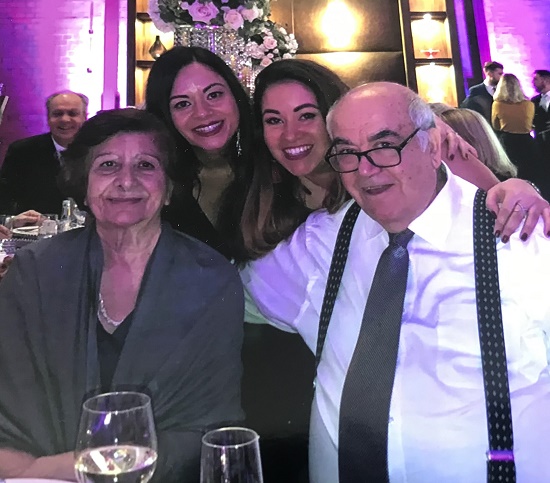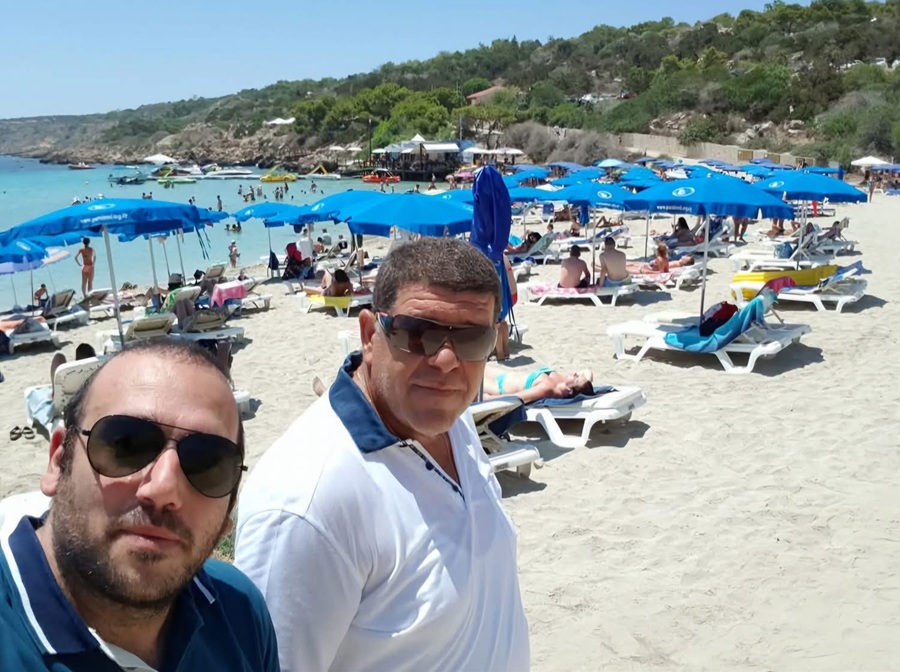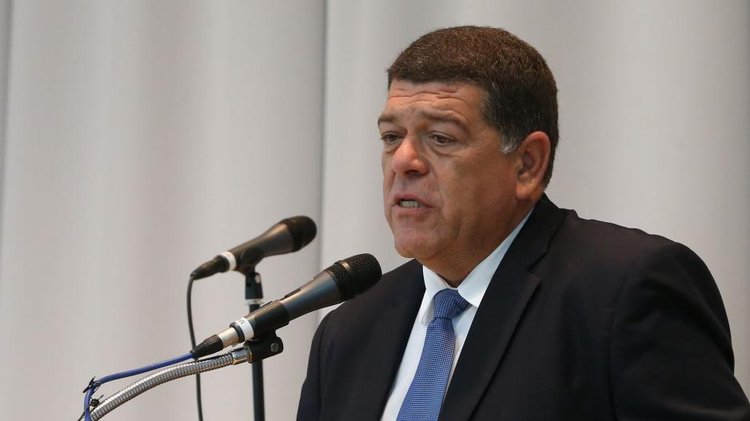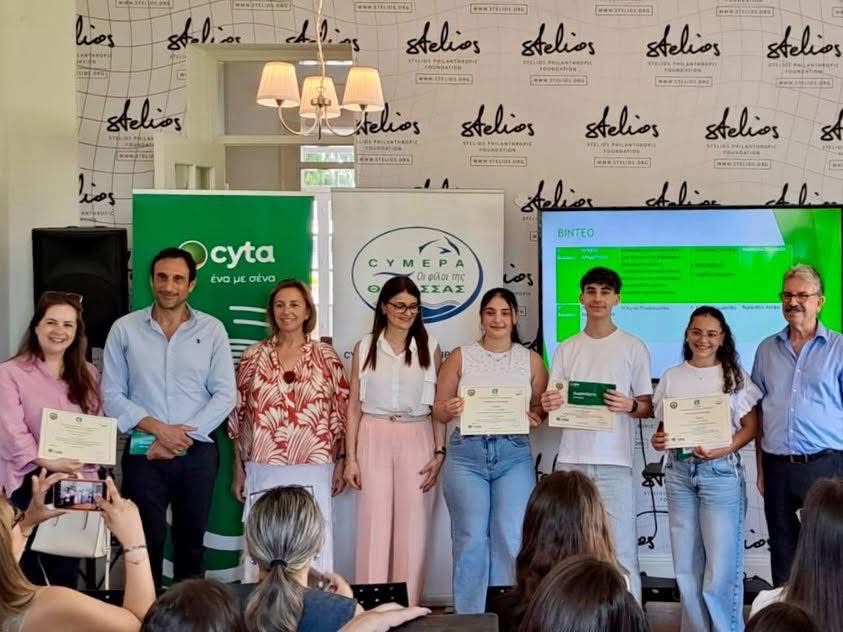Text follows in English
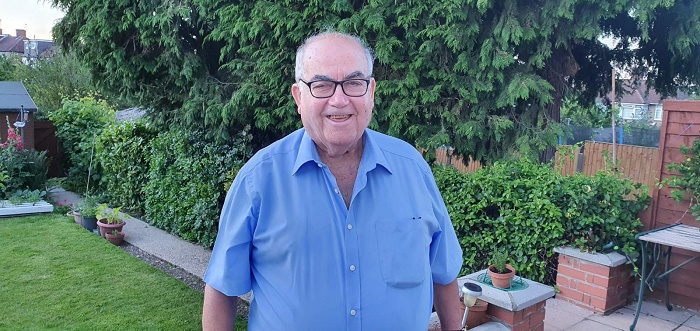
Ο αγαπημένος μας καθηγητής, ο Δρ Ζαννέτος Τοφαλλής, μια από τις πιο φωτεινές και διακεκριμένες μορφές της Κυπριακής Παροικίας του Λονδίνου – ιστορικός, λόγιος, παιδαγωγός, αλλά και βαθιά ανθρώπινος αφηγητής – καταθέτει σήμερα στο SkalaTimes ένα πολύτιμο απόσταγμα μνήμης.
Με τη γραφίδα του αιχμηρή όσο και τρυφερή, ξετυλίγει ένα διήγημα βασισμένο σε προσωπικές του θύμησες· σκηνές και πρόσωπα από τη «μικρή Κύπρο» της αγγλικής πρωτεύουσας, μιας εποχής που χάθηκε, αλλά ζει ακόμη στις καρδιές όσων την έζησαν.
Δεν πρόκειται απλώς για αφήγηση· είναι μια συναισθηματική αναβίωση, μια γέφυρα ανάμεσα στο παρελθόν και το παρόν, ανάμεσα στη ρίζα και το βλέμμα του μετανάστη.
Αξίζει να το διαβάσετε. Όχι μόνο για την ιστορική του αξία, αλλά γιατί κάθε λέξη χτυπά την καρδιά με την αλήθεια και την ευγένεια της μνήμης.
(Δείτε την παλαιότερη συνέντευξή του στο SkalaTimes εδώ: https://www.skalatimes.com/2020/08/19/kathigitis-zannetos-tofallis-sunentefksi-skalatimes/ )
————————————————–
Τι θυμάμαι από την Κυπριακή Παροικία της Αγγλίας
Γράφει ο καθηγητής Ζαννέτος Τοφαλλής
Ο οποίος ζει στο Βόρειο Λονδίνο
Ο Λόγος που γράφω αυτό το άρθρο είναι γιατί πολλά νεαρά Κυπριόπουλα συχνά με ρωτάνε για την Παροικία μας, πώς άρχισε, πώς εξελίχθηκε και πόσοι Κύπριοι ζουν και εργάζονται στην Αγγλία, τη δεύτερή μας πατρίδα. Γι αυτό,γράφω κάτι για τη δική μου ζωή και τις δικές μου εμπειρίες κάτι που τα ξέρω καλύτερα, δίνοντας τις δικές μου εντυπώσεις για την ιστορική αυτή
Παροικία που υπολογίζεται σήμερα ότι αριθμεί γύρω στις τρακόσιες χιλάδες (300,000) συμπατριώτες μας του Ηνωμένου Βασιλείου.
Αρχίζω, λοιπόν….
Κατάγομαι από τους Στύλλους της Μεσαορίας. Στη Αγγλία ήρθα τον Σεπτέμβριο του 1956, όπως έκαναν και χιλιάδες συμπατριώτες μας για μια καλύτερη ζωή. Εδώ βρίσκονταν ήδη ο αδελφός μου ο Ανδρέας και οι δύο αδελφές μου, Δέσποινα και Λουκία. Αργότερα ήρθαν και η μητερα μου
Κατελού και ο μικρότερος αδελφόε μας ο Κύπρος,. Μέναμε πρώτα στο Camden Town, όπως άλλωστε και οι περισσότεροι Κύπριοι εκείνο τον καιρό. Αργότερα μετακινηθήκαμε στο Caledonian Road.
Ήταν θυμάμαι Κυριακή, όταν ο αδελφός μου ο Αντρέας με πήρε σε ένα καφενείο, στο 56 Bayham Street, όπου εκεί βρίσκονταν τα γραφεία του “Βήματος”. Παρόλο που η εφημερίδα τυπωνόταν στην περιοχή του Waterloo, εντούτοις την έφερναν εκεί στο καφενείο στο 56 Bayham Street για
να την τυλίξουν και να την ετοιμάσουν για τις πωλήσεις. Οι εθελοντές που πήγαιναν για το τύλιγμα της εφημερίδας ήταν πολλοί.
Όπως πολλοί ήταν και οι εθελοντές πωλητές της. Εκεί στο καφενείο ήταν το βασικό κέντρο της παροικίας. Όταν π.χ. ήθελες να βρεις κάποιο συμπατριώτη σου, πήγαινες εκεί. Κοντά στο καφενείο ήταν και η εκκλησία των Αγίων Πάντων, στο Pratt Street, μια από τις δύο τότε ελληνικές εκκλησίες του Λονδίνου, η άλλη ήταν η Αγία Σοφία στο Bayswater.
Εκεί, λοιπόν, που καθόμουν στο καφενείο και διάβαζα το “Βήμα”, με πλησίασε ο Τεύκρος Ανθίας. Εγώ τον ήξερα από φωτογραφίες που είχα δει. Με ρώτησε “Σου αρέσει η εφημερίδα;” Απάντησα θετικά. “Θα σε ενδιέφερε να εργαστείς στο “Βήμα;” με ρώτησε. “Δεν προσφέρουμε μεγάλους μισθούς. Πληρώνουμε μόνο 8 λίρες την βδομάδα”, συνέχισε. Φυσικά δέχτηκα.
Ήμασταν δύο δημοσιογράφοι με πλήρη απασχόληση, εγώ και ο Κυριάκος Τσιούπρας από την Κώμη Κεπήρ και πληρωνόμασταν 8 λίρες την βδομάδα.
Ο Κυριάκος ήταν ήδη πτυχιούχος Οικονομολόγος από το Πανεπιστήμιο του Λονδίνου. Υπέροχος άνθρωπος. Υπήρχαν ακόμα δυο δημοσιογράφοι που δούλευαν part time – ο μεγάλος Έλληνας δημοσιογράφος Θεόδωρος Δογάνης, ο οποίος ήταν και ανταποκριτής του «Ριζοσπάστη» και ο Τεύκρος Ανθίας, οι οποίοι πληρώνονταν 6 λίρες την βδομάδα.
Ανεβαίναμε εκεί στο Waterloo στον τρίτο όροφο και εργαζόμασταν. Εμένα δεν με πείραζε γιατί ήμουν νέος, αλλά θυμάμαι ανησυχούσα για τον Τεύκρο Ανθία ο οποίος είχε προβλήματα με την καρδία του και ανέβαινε τρεις ορόφους! Πήγα πολλά σχολεία,, αλλά για μένα το μεγαλύτερο σχολείο ήταν ο Ανθίας. Θυμάμαι πολλά απ’ τον Ανθία….«Ζαννέτο παιδί μου. να παίρνεις πρωτοβουλίες και να γράφεις ό,τι τιμά την Κύπρο να το προβάλλεις», μου έλεγε συχνά.
Στο «Βήμα» ξεκίνησα να εργάζομαι το 1956 και έμεινα εκεί για τρία χρόνια.
Τότε η Παροικία αριθμούσε γύρω στις εκατόν πενήντα χιλιάδες (150,000) Κυπρίους. Σήμερα υπολογίζεται στις 300,000.
Στη συνέχεια, γνώρισα την σύζυγο μου, την Βασούλα Αλεξάνδρου από το Αλεθρικό, παντρευτήκαμε και η Βασούλα επέμενε ότι έπρεπε να συνεχίσω τις σπουδές μου, κάτι που έκανα. Έκανα τα GCE μου, μετά τα πτυχία στο πανεπιστήμιο. Ποτέ δεν θα την ξεχάσω. Σωστή Ηρωίδα!
Οπόταν, λόγω σπουδών, σταμάτησα να εργάζομαι στο “Βήμα” αλλά συνέχισα να στέλνω άρθρα μου, αφιλοκερδώς, όπως και στη συνέχεια έκανα το ίδιο με την εφημερίδα “Παροικιακή” μέχρι και σήμερα. Ήταν πρώτης τάξεως η δημοσιογραφία τότε, με την πέννα του Ανθία, το “Βήμα”, ήταν ποίηση!
Εγώ θαύμαζα τον Ανθία, θυμάμαι διόρθωνα τα κείμενα και διάβαζα όλα όσα γράφαμε τότε. Θυμάμαι τον Ανθία να μου λέει “Ζαννέτο παιδί μου, να παίρνεις πρωτοβουλίες πως να ανεβάσουμε την εφημερίδα και τον λαό.
Να πιάσουμε τον λαό από το χέρι και να τον ανεβάσουμε, να αναπνεύσει καθαρό αέρα”. Φως, Περισσότερο Φως. μου έλεγε καθημερινά!
Η εφημερίδα δεν είχε διαφημίσεις. Είχε έξοδα, πληρώναμε το τυπογραφείο.
Ήταν το τυπογραφείο “Ερμής” που ήταν Διευθυντής ο Χρίστος Κουππάρης.
Η εφημερίδα έπρεπε να πληρώνει, τους 4 δημοσιογράφους, σελιδωτές, ενοίκιο. Άρα η εφημερίδα “ζούσε” από τις πωλήσεις. Την αγόραζαν όλοι και υπήρχαν πολλοί εθελοντές πωλητές οι οποίοι έκαναν καταπληκτική δουλειά, το θεωρούσαν τιμή τους να πωλήσουν τα περισσότερα φύλλα. Μη ξεχνάμε πως το “Βήμα” ήταν ο μοναδικός τρόπος για να μάθουν οι πάροικοι νέα για
την Κύπρο (δεν έρχονταν εφημερίδες απ’ την Κύπρο) και επίσης να μάθουν και τα νέα της παροικίας.
Το «Βήμα» έψαχνε τρόπους να επιζήσει διότι μόνο δύο διαφημίσεις είχε. Η μία ήταν από τον «Καλογέλαστο Χαλουβά», ο Χαλουβάς είχε ένα μπακάλικο στο 6 Plender street και πλήρωνε 25 σελίνια την εβδομάδα και η άλλη μεγάλη μας διαφήμιση ήταν από τον Χωματά ο οποίος είχε το «Cyprus Travel” και πλήρωνε πέντε λίρες την βδομάδα. Επίσης είχαμε κάποιες μικρές αγγελίες με πολύ λιγότερα λεφτά, γύρω στα 12 σελίνια.
Εγώ, εκτός από το ότι έγραφα ό,τι μπορούσα και γνώριζα, έψαχνα τρόπους να βοηθήσω την εφημερίδα, οικονομικά. Σκεφτόμουν και όλους τους εθελοντές που, ανεξαρτήτα από τις καιρικές συνθήκες, στέκονταν μέσα στους δρόμους για να πουλήσουν την εφημερίδα 6 πέννες το φύλλο (ένα σελίνι είχε 12 πέννες).
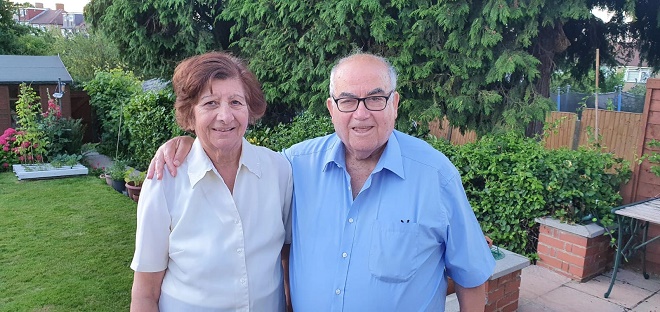
Μαζί με τον Τεύκρον Ανθία και τον Κυριάκο Τσιούπρα, είχα την ευκαιρία να γνωρίσω μερικούς από τους μεγαλύτερους φιλέλληνες πνευματικούς ανθρώπους – τον φιλόσοφο Λόρδο Μπέρτραντ Ράσσελ, τους Ελληνιστές Καθηγητές Τζωρτζ Τόμσον, Ρόμπερτ Μπράουνινγκ., Ντάγκλας Nτέικιν, τους κορυφαίους ηθοποιούς Σερ Λώρενς Ολίβιερ και Σερ Μάικολ Ρέντγκρεηβ, τους διάσημους συγγραφείς Σερ Κόμπτον Μακένζη και την Άγκαθα Κρίστη και πολλούς άλλους. Όλοι φιλέλληνες. Ένοιωθες τόση περηφάνια να τους ακούς να μιλάνε για τον ελληνισμό!
Θυμάμαι όταν ήρθε στο Λονδίνο ο ήρωας της Εθνικής Αντίστασης, ο Μανώλης Γλέζος. Ήταν ο ήρωάς μου. Τον θαύμαζα πάρα πολύ, από τη μέρα που έμαθα ότι μαζί με τον Απόστολο (Λάκη) Σάντα ήταν οι πρωταγωνιστές μιας από τις πρώτες αντιστασιακές πράξεις στην κατεχόμενη Ελλάδα την περίοδο του Β’ Παγκοσμίου Πολέμου, όταν κατέβασαν τη νύχτα της 30ής
προς 31ης Μαΐου 1941 τη σημαία της Ναζιστικής Γερμανίας από τον ιστό του
βράχου της Ακρόπολης στην Αθήνα.
Τότε λοιπόν, και ο Ανθίας έγραφε πολλά άρθρα για τον Γλέζο, ζητώντας την απελευθέρωση του Μανώλη Γλέζου και των Ελλήνων πολιτικών κρατουμένων από τις φυλακές και τις εξορίες . Το 1962 δόθηκε αμνηστία και ο Μανώλης Γλέζος ήρθε στο Λονδίνο για να ευχαριστήσει τον αγγλικό λαό εδώ για τη συμπαράσταση στο δράμα της Ελλάδας.
Μου ανέθεσαν. λοιπόν, με τα σπασμένα μου Αγγλικά, να είμαι ο διερμηνέας του Γλέζου όσο καιρό θα ήταν στο Λονδίνο! Ήμουν πολύ συγκινημένος και θυμάμαι έγραψα ένα άρθρο – συνέντευξη που του πήρα με τίτλο «Έσφιξα το χέρι που ντρόπιασε την σβάστικα» και το δημοσίευσε το «Βήμα» ολοσέλιδο στην πρώτη του σελίδα.
Θυμάμαι, όταν τον σταματούσαν οι Άγγλοι δημοσιογράφοι της τηλεόρασης και τον φωτογράφιζαν. Έγινε μεγάλο θέμα στη Βρετανία. Μιλούσε στα κανάλια και στις εφημερίδες. Έγραφαν τότε οι Βρετανικές εφημερίδες «Ο Ήρωας της Ακρόπολης στο Λονδίνο!».
Το όνειρο του Χίτλερ, όταν μπήκαν τα γερμανικά στρατεύματά στην Αθήνα, ήταν να υψώσει την σβάστικα πάνω στην Ακρόπολη, το σύμβολο του Πολιτισμού, δηλώνοντας ότι «Από τούδε και στο εξής όλος ο κόσμος θα είναι υπό την κατοχή των Ναζί για δύο χιλιάδες χρόνια».
Αυτό που με συγκίνησε ιδιαίτερα για τον Γλέζο ήταν ότι Αγγλίδες ηλικιωμένες γυναίκες, τον σταματούσαν στους δρόμους και του φιλούσαν το χέρι και του έλεγαν «ευχαριστούμε» γι αυτό που έκανε ντροπιάζοντας τον φασισμό. .
Όταν κατέβασε την ναζιστική σημαία από την Ακρόπολη, ο ο Βρετανός Πρωθυπουργός Σερ Winston Churchill είχε πάει στα γραφεία του BBC World Service και διακήρυξε στα ελληνικά « Από σήμερα δεν θα λέμε ότι – Οι Έλληνες σαν Ήρωες, αλλά οι Ήρωες αγωνίζονται σαν Έλληνες! Ζήτω ο Μανώλης Γλέζος». Και συνέχισε «Your name will remain in history» (Το
όνομα σου θα παραμείνει στην Ιστορία).
Για πρώτη φορά, λοιπόν, όταν είχε έρθει το 1962 τον προσκάλεσαν να πάει στο Βρετανικό Κοινοβούλιο, τγια να τον τιμήσουν και να τον ευχαριστήσουν και για να απευθύνει χαιρετισμό – δεν ήταν ήρωας μόνο της Ελλάδας αλλά και της Ευρώπης, καθότι κατάφερε να ντροπιάσει τον Χίτλερ και τον φασισμό!.
Πήγαμε, λοιπόν, στο Κοινοβούλιο, και εγώ που τον συνόδευα, έκλαιγα σαν το μωρό! Ήταν πολύ συγκινητικό. Από τη μια πλευρά οι Συντηρητικοί, απ’ την άλλη οι Εργατικοί, υποκλίνονταν όλοι μπροστά του.
Κι εγώ σκεφτόμουν: «Στην πατρίδα του, τον καταδίκασαν σε εκτέλεση δύο φορές, τον καταδίκασαν σε ισόβια, τον βασάνισαν, και τώρα οι Βρετανοί τον αντιμετωπίζουν ως ήρωα και υποκλίνονται μπροστά του!» Και τι τους είπε ο Γλέζος στη Βουλή; «Μα δεν έκανα και τίποτα το σπουδαίο! Έκανα απλώς το καθήκον μου προς την πατρίδα μου!». Τόσο ταπεινός ήταν!
Αυτή ήταν η πρώτη γνωριμία μου με τον Γλέζο. Μετά ήρθε μαζί με τον Γρηγόρη Λαμπράκη στην Πορεία Ειρήνης του Ωλντερμαστον. Στην Ελλάδα δόθηκε τότε η τιμητική σειρά – πρώτη στην πορεία η Ελληνική Αντιπροσωπεία! Και οι άλλες χώρες με αλφαβητική σειρά!
Λίγο μετά την τοπυρική εισβολή, έγινε η ίδρυση του ΑΚΕΛ Βρετανίας, Αποφασίστηκε να εκδοθεί και η εφημερίδα «Παροικιακή Χαραυγή». Στην αρχή στεναχωρήθηκα και το είδα ως κάτι αρνητικό, να υπάρχουν δύο εφημερίδες στην Παροικία! Πίστευα πως θα μπορούσαν να βρουν ένα κοινό παρονομαστή και να συνεργαστούν αντί να υπάρχουν δύο εφημερίδες. Τελικά
έκλεισε το ΒΗΜΑ και συνέχισε η Παροικιακή.
Μια άλλη ζωηρή θύμηση ήταν όταν το 1984 με κάλεσαν τα παιδιά του LGR, ενός πειρατικού τότε ραδιοσταθμού, ο Άκης Ηρακλέους, ο Τάκης Χαρμαντάς και ο Κοκής Γρηγορίου και ζήτησαν την βοήθεια μου για να πάρει άδεια ο ραδιοσταθμός. Εγώ το πήρα πολύ ζεστά το θέμα και από την στιγμή που μου ανάθεσαν την “αποστολή” να βοηθήσω να πάρει άδεια ο ραδιοσταθμός, άρχισα να σκέφτομαι και να εργάζομαι μέρα νύχτα προς αυτή την κατεύθυνση.
Να σημειώσω, ότι ενώ οι άλλοι τρεις ήταν Djs και έβαζαν τραγούδια στον ραδιοσταθμό, εγώ έκανα εκπομπές με ομιλίες. Κοινωνικές, πνευματικές, πολιτικές, κοκ. Να αναφέρω ότι για τις εκπομπές που έκανα δεν πληρωνόμουν. Γιατί; Πέστε το βλακεία, πέστε το ότι θέλετε… Έτσι ένοιωθα. Ήθελα να βοηθήσω την παροικία να αποκτήσει τον δικό της ελληνικό ραδιοσταθμό, Ο ενθουσιασμός της Παροικίας για τον σταθμό ήταν πρωτόγνωρος.
Για φανταστείτε ότι όταν κάμαμε έκκληση στην Παροικία για υποστήριξη της αίτησης για άδεια μαζέψαμε 50 χιλιάδες υπογραφές από Κύπριους του Λονδίνου για να πάρει άδεια το LGR. Ούτε για την ελευθερία της Κύπρου δεν μαζέψαμε τόσες υπογραφές! Τις υπογραφές τις μαζέψαμε από πόρτα σε πόρτα! Δούλευαν όλοι εθελοντικά για τον LGR.
Και κάτι άλλο, πρωτόγνωρο. O Lord Chancellor της Αγγλίας που θεωρείται πάνω από τον Πρωθυπουργό και κάτω από τη Βασίλισσα ήταν ο Lord Hailsham (Quintin Hogg), ο οποίος ήταν μαθητής μου, που μάθαινε νέα ελληνικά. Ο Νομοθέτης της χώρας. Ήταν τόσο απλός, που πήγαινε στη δουλειά με το ποδήλατο του! Σκέφτηκα να τον καλέσω στο σπίτι μου για
φαγητό και να μιλήσουμε και ελληνικά. Όπως και έκανα. Με πήραν λοιπόν τηλέφωνο από το 11 Downing Street και μου είπαν ότι είχε αποδεχτεί την πρόσκληση μου. Ο Lord Hailsham ήρθε στο σπίτι μου για φαγητό, ήταν πολύ απλός. Κάποια στιγμή άρχισα να του μιλώ για το LGR και να του εξηγώ ότι είμαι κι εγώ μέσα στην κίνηση αυτή για ελληνικό ραδιοσταθμό και ότι επιδιώκω και εργάζομαι έτσι ώστε να εξασφαλίσει άδεια ο μοναδικός ελληνικός σταθμός του Λονδίνου. «Πρέπει να δώσουμε άδεια στον ραδιοσταθμό αυτής της παροικίας την οποία εσείς εκτιμάτε τόσο πολύ» του είχα πει.
Τότε μου υποσχέθηκε ότι θα μιλούσε στην Maggi (Margaret Thatcher).
Και κάπως έτσι εξασφαλίσαμε την άδεια. Τον Μάιο του 1989. Όταν πήραμε την άδεια, εγώ αποχώρησα από το σταθμό, για να επικεντρωθώ στην ακαδημαϊκή και στη μεταφραστική μου εργασία.
Αυτές λοιπόν ήταν μερικές από τις θύμισές μου για τα 70 τόσα χρόνια ζωής μου στο Λονδίνο…
ΖΑΝΝΕΤΟΣ ΤΟΦΑΛΛΗΣ
Ιούνιος 2025
(ztofallis@gmail.com)
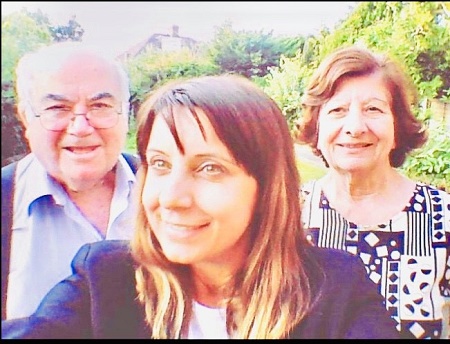
Memories from the Cypriot Community in London
A short story like a page from a fine literary book, by Dr. Zannetos Tofallis
Our beloved professor, Dr. Zannetos Tofallis – one of the brightest and most distinguished figures of the Cypriot Community in London: a historian, scholar, educator, and deeply human storyteller – shares with SkalaTimes today a precious distillation of memory.
With a pen both sharp and tender, he unfolds a short story based on his personal recollections; scenes and faces from the “little Cyprus” within the British capital – from a time now gone, but still alive in the hearts of those who lived it.
This is not just a narration; it’s an emotional revival, a bridge between past and present, between roots and the gaze of the migrant.
It’s worth reading – not only for its historical value, but because every word strikes the heart with the truth and grace of memory.
(Read his earlier interview with SkalaTimes here: https://www.skalatimes.com/2020/08/19/kathigitis-zannetos-tofallis-sunentefksi-skalatimes/)
What I Remember from the Cypriot Community in England
By Professor Zannetos Tofallis
Resident of North London
The reason I am writing this article is because many young Cypriots often ask me about our Community – how it began, how it evolved, and how many Cypriots live and work in England, our second homeland. So, I decided to write something from my own life and experiences, something I know best, sharing my impressions of this historic Community, which is now estimated to number around three hundred thousand (300,000) compatriots in the United Kingdom.
So, here I begin…
I come from Stylous, in the Mesaoria region. I arrived in England in September 1956, like thousands of other fellow Cypriots in search of a better life. My brother Andreas and my sisters Despina and Loukia were already here. Later, my mother Katelou and our youngest brother Kypros joined us. We first lived in Camden Town – like most Cypriots at the time – and later moved to Caledonian Road.
I remember it was a Sunday when my brother Andreas took me to a coffee shop at 56 Bayham Street, where the offices of Vima (The Tribune) were located. Although the newspaper was printed in the Waterloo area, it was brought to that coffee shop at 56 Bayham Street for wrapping and preparation for sale. There were many volunteers who helped with wrapping the papers – as there were many volunteer sellers too. That coffee shop was the main hub of the community. If you were looking for a fellow Cypriot, you went there.
Nearby was the Church of All Saints on Pratt Street – one of only two Greek churches in London at the time. The other was St Sophia’s in Bayswater.
As I sat in the coffee shop reading Vima, Teukros Anthias approached me. I recognized him from photos I had seen.
“Do you like the paper?” he asked.
I nodded.
“Would you be interested in working for Vima?” he asked.
“We don’t pay much – only eight pounds a week,” he continued. Naturally, I accepted.
We were two full-time journalists – myself and Kyriakos Tsioupras from Komi Kepir – and we each earned 8 pounds a week. Kyriakos was already a graduate economist from the University of London. A wonderful man. There were also two part-time journalists: the great Greek journalist Theodoros Doganis – who was also the correspondent for Rizospastis – and Teukros Anthias. They earned 6 pounds a week.
We worked on the third floor of a building in Waterloo. I didn’t mind climbing the stairs – I was young – but I remember worrying about Anthias, who had heart problems and had to climb all three floors! I went to many schools, but the greatest school for me was Anthias himself. I remember many things he used to say…
“Zanneto, my child, always take initiative. And write anything that honors Cyprus – highlight it!” he would often tell me.
I started working at Vima in 1956 and stayed for three years. At the time, the community numbered around one hundred and fifty thousand (150,000) Cypriots. Today, it’s estimated at 300,000.
Later, I met my wife, Vasoula Alexandrou from Alethriko. We got married, and she insisted that I should continue my studies – and I did. I completed my GCEs and then went on to earn university degrees. I will never forget her. A true heroine!
Because of my studies, I stopped working at Vima, but I continued submitting articles voluntarily. I did the same with the newspaper Parikiaki – and still do to this day. Journalism at that time was first-rate, especially with Anthias’ writing – Vima was poetry!
I admired Anthias. I remember proofreading the texts and reading everything we published. Anthias would say to me:
“Zanneto, my child, take initiative – think how to lift the newspaper and the people. Take the people by the hand and raise them, help them breathe clean air. Light – more light!” he told me every day.
The newspaper had no advertisements. It had expenses – we had to pay the printers. It was printed at Hermes Printing, whose director was Christos Koupparis. The newspaper had to cover the salaries of four journalists, page layout staff, and rent. So, Vima “survived” through sales. Everyone bought it, and there were many volunteer sellers who did an incredible job. They considered it an honor to sell the most copies.
Let’s not forget: Vima was the only way for the Cypriot community to learn news from Cyprus (since no papers came from the island) and also to hear about community affairs.
“To Vima” was always looking for ways to survive, since it was only supported by its sales. There were no advertisements, and the newspaper had many expenses: printing costs, typesetting, rent, and the salaries of the four journalists. The printing house, Hermes, was run by Christos Koupparis. Still, To Vima was everyone’s newspaper. All Cypriots bought it, and many volunteered to sell it, seeing it as an honour to sell the most copies.
Let’s not forget that To Vima was the only way for the Cypriot community in London to find out what was happening in Cyprus—no newspapers arrived from the island at that time—and it was also the only way to keep up with the news of the community itself.
As for my personal memories, I consider those years as deeply formative. Life was not easy, but we had ideals, solidarity, and the strength of community. We supported each other, worked hard, studied in the evenings, saved every penny, and dreamt of better days.
In those early years, many Cypriots lived in Camden, Kentish Town, and Caledonian Road. Later, the community expanded further north, towards Wood Green, Palmers Green, and Southgate. Churches, schools, and community centres began to be established, and slowly, our community flourished. It found its place in British society while never forgetting its roots.
I owe a lot to my wife, Vasoula, for encouraging me to pursue further education. After our marriage, she insisted I take my GCEs and university degrees. She stood by me every step of the way, with love and resilience. She was, and remains, a true heroine in my life.
Even after I left To Vima, I continued to write voluntarily for it and later for the newspaper Parikiaki, right up to today. I consider journalism not only a profession but a mission: to uplift our people, to speak truth, and to preserve memory.
I still remember Teukros Anthias’ voice in my ears:
“Zannetto, my boy, take the initiative. Write whatever honours Cyprus. Highlight it. Let’s raise the people. Let’s help them breathe fresh air. Light, more light!”
The newspaper had no advertisements. It had expenses—we paid the printing house.
It was the “Hermes” printing press, directed by Christos Koupparis.
The newspaper had to pay the four journalists, the layout editors, and rent.
So the newspaper “survived” through sales. Everyone bought it, and there were many volunteer sellers who did an amazing job—they considered it an honor to sell the most copies.
Let’s not forget that “Vima” was the only way for the diaspora to learn news from Cyprus (since no newspapers from Cyprus arrived) and also to stay updated on community news.
“Vima” was constantly looking for ways to survive because it had only two advertisements.
One was from “The Smiling Halouvas”—Halouvas had a grocery shop at 6 Plender Street and paid 25 shillings a week. Our other major ad was from Chomatas, who owned “Cyprus Travel” and paid five pounds a week. We also had a few small classifieds for much less—about 12 shillings.
As for me, besides writing everything I could and knew, I was always trying to find ways to financially support the newspaper. I kept thinking of all the volunteers who, regardless of the weather, stood out on the streets to sell the paper, which cost 6 pence per issue (a shilling had 12 pence).
Together with Teucer Anthias and Kyriakos Tsioupra, I had the opportunity to meet some of the greatest philhellene intellectuals—
the philosopher Lord Bertrand Russell, the Hellenist Professors George Thomson, Robert Browning, Douglas Dakin,
the renowned actors Sir Laurence Olivier and Sir Michael Redgrave, the famous authors Sir Compton Mackenzie and Agatha Christie, and many others. All philhellenes.
You felt so proud hearing them speak about Hellenism!
I remember when the hero of the National Resistance, Manolis Glezos, came to London. He was my hero.
I admired him deeply, ever since I learned that he and Apostolos (Lakis) Santas carried out one of the first acts of resistance in occupied Greece during World War II, when they tore down the Nazi flag from the flagpole on the Acropolis on the night of May 30 to 31, 1941.
Back then, Anthias wrote many articles about Glezos, calling for the release of Manolis Glezos and all Greek political prisoners from prisons and exile.
In 1962, an amnesty was granted, and Manolis Glezos came to London to thank the British people for their solidarity with Greece’s plight.
So, I was assigned—with my broken English—to be Glezos’ interpreter during his time in London!
I was deeply moved, and I remember writing an article-interview titled “I Shook the Hand That Shamed the Swastika,”
which “Vima” published as a full-page feature on its front page.
I remember when British TV journalists would stop him and take his photo. It became a major story in the UK.
He spoke on television and in newspapers. British press at the time wrote: “The Hero of the Acropolis in London!”
Hitler’s dream, when German troops entered Athens, was to raise the swastika over the Acropolis—the symbol of Civilization—declaring:
“From now on, the whole world will be under Nazi rule for two thousand years.”
What moved me most about Glezos was how elderly British women would stop him on the streets, kiss his hand, and say “thank you” for what he did to shame fascism.
When he took down the Nazi flag from the Acropolis, the British Prime Minister, Sir Winston Churchill, went to the offices of the BBC World Service and proclaimed in Greek: “From today we shall not say that Greeks fight like heroes, but that heroes fight like Greeks! Long live Manolis Glezos.”
And he added: “Your name will remain in history.”
So, for the first time, when he came in 1962, they invited him to the British Parliament to honor and thank him, and to allow him to address a greeting – for he was not only a hero of Greece but of Europe as well, since he managed to shame Hitler and fascism!
We went to Parliament, and I, who accompanied him, was crying like a baby!
It was incredibly moving. On one side the Conservatives, on the other the Labour Party – all bowed before him.
And I kept thinking: “In his own country, he was sentenced to execution twice, he was sentenced to life imprisonment, he was tortured, and now the British treat him like a hero and bow before him!” And what did Glezos say in Parliament?
“But I didn’t do anything great! I simply did my duty to my homeland!” That’s how humble he was.
That was my first encounter with Glezos. Later, he came together with Grigoris Lambrakis to the Aldermaston Peace March. Greece was given the honor of leading the march – the Greek delegation first! And the other countries followed in alphabetical order.
Shortly after the Turkish invasion, the AKEL branch in Britain was founded.
It was decided to also publish the newspaper “Paroikiaki Haravgi.” At first, I was upset and saw it as something negative, that there would be two newspapers in the community! I believed they could find common ground and work together instead of splitting into two papers.
In the end, To Vima closed down, and Paroikiaki Haravgi continued.
Another vivid memory was when, in 1984, I was invited by the young men of LGR – which was a pirate radio station at the time – Akis Heracleous, Takis Harmantas, and Kokis Gregoriou. They asked for my help in securing a broadcasting license for the station.
I took the matter very seriously, and from the moment I was given this “mission,” I began working day and night towards that goal.
Let me note that, while the three others were DJs playing music, I was doing talk shows – social, intellectual, political, and so on. I should mention that I wasn’t paid for the shows I did. Why? Call it foolishness, call it what you will… That’s just how I felt.
I wanted to help the community establish its own Greek radio station. The community’s enthusiasm for the station was unprecedented.
Just imagine: when we made a public appeal to support the application for a license, we gathered 50,000 signatures from Cypriots in London.
We didn’t even collect that many signatures for the freedom of Cyprus!
We went door to door to collect them. Everyone worked as a volunteer for LGR.
And one more unique thing. The Lord Chancellor of England, who is considered above the Prime Minister and just below the Queen, was Lord Hailsham (Quintin Hogg), who had once been my student learning Modern Greek. The country’s Lawmaker.
He was so humble that he rode his bicycle to work! I thought of inviting him to my home for a meal so we could also speak Greek – and I did.
I got a call from 11 Downing Street, informing me he had accepted the invitation.
Lord Hailsham came to my home for dinner. He was very simple. At some point, I began telling him about LGR and explaining that I was involved in the effort to secure a license for London’s only Greek radio station.
“We must grant a license to this community’s radio station, which you hold in such high regard,” I told him.
He then promised me that he would speak to Maggie (Margaret Thatcher).
And that’s more or less how we secured the license – in May 1989.
Once the license was granted, I stepped away from the station to focus on my academic and translation work.
These, then, are a few of my memories from my seventy-plus years of life in London…
Zannetos Tofallis
June 2025
(ztofallis@gmail.com)

